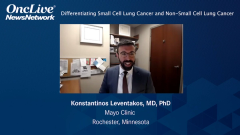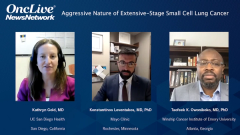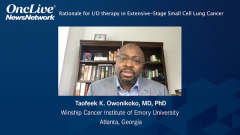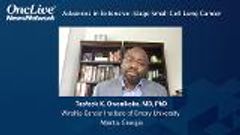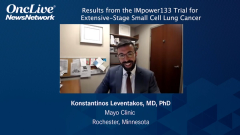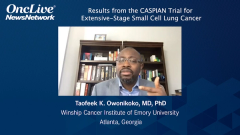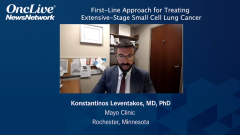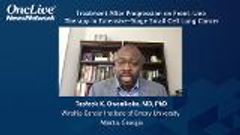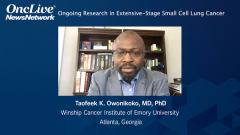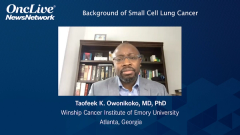
Treatment After Progression on Front-Line Therapy in Extensive-Stage Small Cell Lung Cancer
Episodes in this series

Kathryn Gold, MD: Our frontline options are improving, but unfortunately, for most of our patients, the vast majority will still progress after frontline therapy. What treatment options do you consider with a patient progressing after platinum with immunotherapy, or platinum etoposide with immunotherapy?
Taofeek K. Owonikoko, MD, PhD: We’re all excited about the efficacy impact, the survival impact, of adding immunotherapy to chemotherapy in the frontline. We have a new frontline regimen. Whatever we used to consider our second-line regimen is no longer as meaningful as it used to be because our frontline regimen has changed. Whatever we’re doing in the second-line, third-line salvage setting is up in the air. Before the IMpower133 and CASPIAN trials came on board, our approach had always been that if the patient tolerated the frontline chemotherapy well and had very durable duration of response, go back and retreat them. Now we have 2 randomized trials showing that re-treatment with platinum doublet, in terms of overall survival, is probably no better than using topotecan, and that could also come at the expense of perhaps slightly higher hematologic toxicity rates. If topotecan is something that none of us wants to use to start, and our re-treatment with platinum doublet is no better, that area becomes wide open.
In the contemporary setting where we’ve treated patients with chemotherapy-immunotherapy, we’ve had only 1 newly approved drug, which is lurbinectedin. This had accelerated approval and a limited data set, and the majority of those patients did not get chemotherapy-immunotherapy. A small number of the patients, maybe about 20% or so, got exposed to immunotherapy before going on the lurbinectedin trial. I put that at the back of my mind when I decide what to do for patients.
What factors do I consider? How quickly is the patient progressing following chemotherapy-immunotherapy? If somebody is progressing during the induction phase, that is a very bad sign. That means that it doesn’t matter what salvage option you want to use because it’s probably not likely to work. That’s where I would bring forward the discussion about quality of life and try something to see if it helps. If somebody went through the induction well and stayed on the immunotherapy for a while, then you have some options to explore. Lurbinectedin could be an option there. You could also think of other strategies that may be immunotherapy-based, but that would be part of a clinical trial because the single-agent approval that we have for immunotherapy now is more in the third-line, so the patient would expect to have failed frontline and another agent. Those don’t come into the picture until you get into the third line.
When we look at the lurbinectedin data, we know that patients who did well with platinum doublet chemotherapy also did better with lurbinectedin. There’s something to be said for platinum sensitivity. You’re twice as likely to respond if you responded to platinum doublet. For those patients, my inclination would be that if you responded well to platinum doublet and I have to do something in the second line, I would go with lurbinectedin. If the patient did not respond well, the response rate we see with lurbinectedin is similar to what you would expect with any other cytotoxic agent we’ve used based on limited phase 2—even topotecan—with single-digit to approximately 20% to 22% response rate.
Overall, is the patient platinum sensitive or platinum resistant? If they are platinum sensitive, I would probably lean more toward lurbinectedin. If they’re platinum resistant, then I would look at patient characteristics and discuss goal of care. If the patient still wants to give it a shot, lurbinectedin would still be an option. For that group of patients, I would look toward new approaches with clinical trials to see if there’s something that would be better than what we currently have.
Kathryn Gold, MD: Konstans, is your practice any different? Have you had any personal experience with lurbinectedin so far?
Konstantinos Leventakos, MD, PhD: We have been able to use it in many of our patients, but it’s too early. It’s seems to be more well tolerated than topotecan. Because the patients did not progress in the clinical trial, I used it with patients who were already failing with topotecan. I could see a difference in the way they could tolerate it. Lurbinectedin is becoming very strong in the second line for patients who are good candidates, as Taofeek said.
The only question is, what do we do with newer therapy? Only clinical trials will be able to answer that. We have decided that it is so great in the first line, but when we’re thinking about progressing, we forget it until we remember it again in the third line. Clinical trials will investigate whether continuing to have the backbone of immunotherapy would make any difference, and that would be a good question for the future. Topotecan will have a role for patients who might be progressing with lurbinectedin and have a good performance status. I’m looking forward to combinations with immunotherapy for these agents that would make a difference.
Kathryn Gold, MD: I completely agree with you that clinical trials are needed to determine how we use immunotherapy in people who progress on frontline chemotherapy-immunotherapy. As part of standard of care, do you think there’s any role for continuation of immunotherapy in someone who has progressed on it?
Konstantinos Leventakos, MD, PhD: I’m a little biased because I believe in the backbone of immunotherapy. … Have we done it? Yes. Outside the clinical trial, it wouldn’t be a good way to know that you have data. We have a trial where we’re talking about second options of chemotherapy while we continue the immunotherapy. We can follow this data to see, first, if it’s safe, and second, if we can get some signal from responses. It’s an amazing time; many things are coming for small cell lung cancer.
Kathryn Gold, MD: That segues nicely into our next question.
Transcript Edited for Clarity


